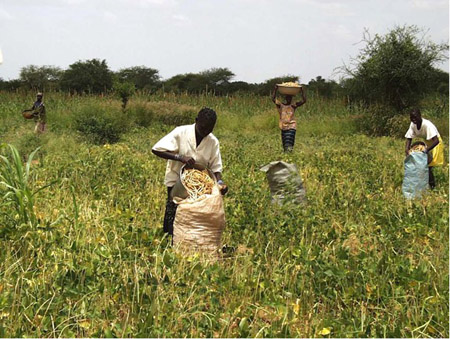Gates Integrated Pest Management (IPM) West Africa
Funded by the Bill & Melinda Gates Foundation, this project is managed by the Legume Innovation Lab.
Project Overview (PDF)
This IPM project seeks to develop a prototype for a system integrating biological controls with farmer learning. It focuses on the following three pillars:
- An Expert System (ES) for modeling pest attacks with a Farmer Interface Application (FIA) that has the potential for both receiving data and delivering pest control recommendations;
- Experimental releases of biological control agents and an assessment of their effectiveness; and
- Completion of ex ante economic analysis to estimate the potential impact of biologicals. This Prototype Project will run from July 2014 – June 2017.
Cowpeas are one of the fundamental food security crops for smallholder farmers in West Africa, yet insect pests present a continuing danger to production while the chemical pesticides to fight them pose health and environmental risks. This project is to develop the prototype of a precision integrated pest management (IPM) platform based on bringing cowpea researchers, extension workers, and farmers together to collect pest data, identify and communicate sustainable pest management solutions. Researchers from Michigan State University, University of Illinois (Urbana Champaign) and the International Institute of Tropical Agriculture (IITA), in collaboration with the Institut de Recherche Agricola du Benin (INRAB) have developed this innovative program. Based on crop and pest modeling, an expert system will be set up to provide the scientific basis for deriving and then identifying pest control solutions in real time. Solutions will involve new biological controls being tested here, along with biopesticides and other pest management options. Cellphone technology and simple visuals within an application will provide the data gathering and learning tools for farmers. Using surveys and choice experiments, the project team will assess the potential impacts of the use of such an integrated system. While the prototype development is based in Benin and focuses on pod-borers in cowpea production, the potential for regional release of such IPM systems will be evaluated. The initial funding for this cowpea IPM project spans a three-year period from July 2014 through June 2017.
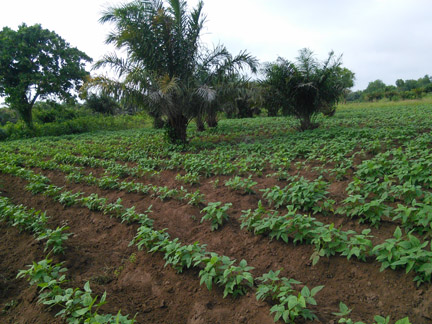
Cowpea Field in southern Benin
Project Description
There are more than 10 million smallholder cowpea farmers in five West African countries (Benin, Burkina Faso, Ghana, Niger, and Nigeria). This project provides the foundation for a sustainable effort to address insect pest attacks that currently reduce cowpea grain yields by over 50%. Given the health, financial, and environmental issues associated with smallholder farmers' dependence on chemical pesticides, it is vital to identify alternative pest control strategies. The long term vision of this project is to develop a highly scalable precision Integrated Pest Management (IPM) platform. This IPM initiative leverages digital systems, and incorporates traditional and novel approaches including biological control agents (i.e. natural enemies or parasitoids), local biopesticides, new cowpea varieties, and other good farming practices to address farmers’ needs for safe, sustainable, and cost-effective management of cowpea pests.
The project focuses on the following three pillars:
- Development of a prototype Expert System (ES) for modeling pest attack combined with a Farmer Interface Application (FIA) that has the potential for both receiving data and delivering pest control recommendations
- Experimental releases of biological control agents and assessment of their effectiveness
- Completion of ex ante economic analysis to estimate the potential impact of biologicals with complementary financial analysis of community biopesticide production
Activities under the three pillars focus on control of the cowpea pod-borer, Maruca vitrata, in Benin. This pod-borer is a major insect pest that reduces cowpea productivity in West Africa. Benin is an ideal location for developing this IPM approach because it is representative of the major cowpea agro-ecologies and smallholder demographics of West Africa. Also, the Biocontrol Unit of the International Institute of Tropical Agriculture (IITA) is located in Benin thereby increasing the cost-effectiveness of the project.
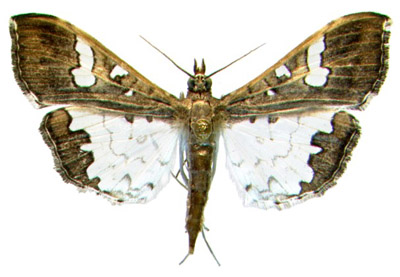
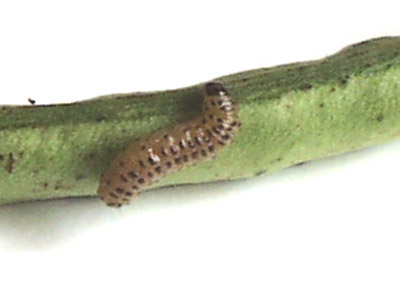
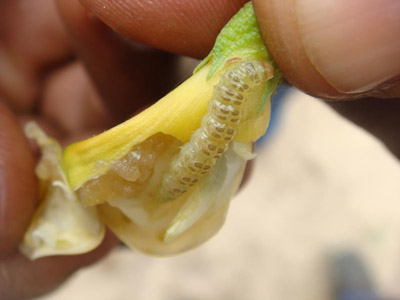
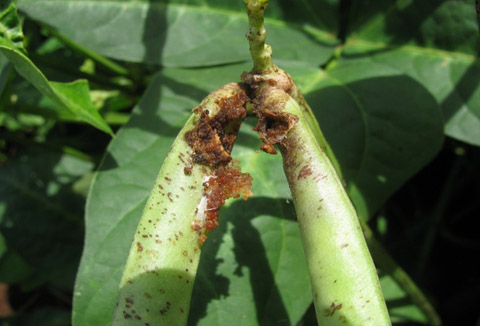
The Three Project Pillars
For Pillar 1, a prototype expert system is being assembled from new and existing models, datasets, and digital platforms on pest and natural enemies, farmer economics, ecology and dynamics, population genetics, and long term climatic data relevant to the cowpea pod-borer in West Africa. Much of the existing data is derived from multi-year collaborative projects led by the University of Illinois at Urbana-Champaign (UIUC) and IITA. Based on available data, the expert system will enable us to identify pest problems and propose local solutions. FIA will be a simple cell phone technology that allows farmers and other stakeholders (e.g. extension agents) to input data into the expert system and instantly receive pest control recommendations in local languages.
The farmer App is being designed for both data collection and solution delivery capability. First, we are identifying the necessary components of the data collection and the minimum dataset required for diagnosis. Subsequently, we will develop (or adapt) an internet–based interface to be used by farmers and others in the field for collecting data on pest occurrences. The data methodology will be validated by comparing data collected by farmers to those collected by extension agents and field researchers. Following validation, the pest data from Benin will be integrated into the prototype expert system to generate preliminary sets of recommendations to be evaluated by researchers and extension agents.

FIA delivering pest management recommendations on a cellphone
On Pillar 2, a key component of the expert system, this project will conduct field evaluations of biocontrol agents through experimental releases of novel parasitoids in Benin, targeting Maruca vitrata. These evaluations provide critical information for the expert system and for developing an implementation strategy for safe and effective large scale releases of parasitoids. These releases will follow confined lab and screenhouse testing consistent with the Food and Agriculture Organization (FAO) code of conduct for importation and release of biocontrol agents (Code of conduct for the import and release of exotic biological control agents). Data collection with FIA could potentially provide a mechanism for tracking impact of the released parasitoids, resulting in appropriate recommendations for farmers.
With regard to Pillar 3, this project is conducting economic analyses to provide insights into the potential economic and financial sustainability of the IPM intervention. A major effort is an ex ante assessment of financial and economic impacts of biological controls on smallholder farmers and farming systems in Benin. Using new data systems with tablets and the Open Data Kit (ODK) digital data collection methods, adapted for use in Benin, household surveys will capture information on demographics, current farmer crop and pest management practices, and other aspects (Figure 4). With the addition of biological controls to the management options, decision experiments were conducted with farmers to understand how farmers might modify their use of chemical pesticides and other pest control measures. A complementary analysis will look at financial aspects of cottage industry production of a pod-borer-specific virus by women’s groups. Establishing the direct and spillover effects of biologicals as well as the financial viability of biopesticides contributes to IPM strategy development.
Vision
Our vision for cowpea pest control is deployment of locally tailored interventions built on an underlying infrastructure that is able to monitor pest pressure and respond in real time. Beyond the scope of this 36-month project, the expert system will use farmer, extension, and researcher collected data from FIA coupled with the linked datasets to produce tailored, precision IPM solutions that would feed back into FIA to provide local recommendations to individual farmers.
For the future delivery of farm level recommendations, we will explore the potential for linking with or adapting existing knowledge exchange platforms such as appropriate training materials in Scientific Animations Without Borders (SAWBO; http://sawbo-illinois.org/main.htm) and elsewhere. Finally, the platform will be expanded to cover other cowpea producing countries in West Africa as well as additional pests.
